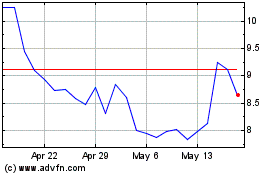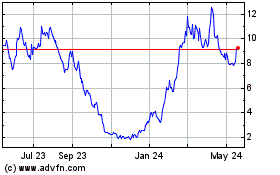Arcutis Biotherapeutics, Inc. (Nasdaq: ARQT), a commercial-stage
biopharmaceutical company focused on developing meaningful
innovations in immuno-dermatology, today announced that Pediatric
Dermatology published online positive results from INTEGUMENT-PED,
the pivotal phase 3 randomized vehicle-controlled trial evaluating
the efficacy and safety of ZORYVE (roflumilast) cream 0.05% as a
once-daily, steroid-free treatment for mild to moderate atopic
dermatitis (AD) in children 2 to 5 years old.
The study found that treatment with investigational once-daily
ZORYVE cream 0.05% resulted in significant improvements across
multiple efficacy endpoints, including achieving a statistically
significant improvement in the primary efficacy endpoint of IGA
Success, as well as statistically significant improvements in
additional endpoints, including 75% improvement in the Eczema Area
and Severity Index (EASI-75) and Worst Itch Numeric Scale (WI-NRS)
at Week 4. The data also show improvement in itch (pruritus) was
observed as early as 24 hours after first application.
“AD is a chronic, inflammatory skin disease affecting 1.8
million children ages 2 to 5 in the United States with burdensome
symptoms that often result in impaired quality of life for both
patients and their caregivers,” said Lawrence F. Eichenfield, MD,
chief of pediatric and adolescent dermatology at Rady Children's
Hospital-San Diego and lead author on the publication. “Results
from the INTEGUMENT-PED trial demonstrate that ZORYVE cream 0.05%
can quickly and reliably improve the symptoms of AD, especially
itch. The publication of these results and the entire clinical
development program highlight that ZORYVE cream 0.05%, if approved,
could fill a significant gap in the current treatment landscape for
a once-daily steroid-free topical therapy that is appropriate for
both the short and long-term management of AD, key concerns for
young patients and their caregivers.”
INTEGUMENT-PED is a Phase 3, parallel group, double blind,
vehicle-controlled trial in which roflumilast cream 0.05% or
vehicle was applied once daily for four weeks to children 2 to 5
years of age with mild to moderate AD. A total of 652 children were
enrolled in the study, with a mean Body Surface Area (BSA) of 22%
overall, and a range from 3% to 82%.
As previously reported, at Week 4, 25.4% of children treated
with ZORYVE cream 0.05% achieved vIGA-AD Success, defined as a
validated Investigator Global Assessment – Atopic Dermatitis
(vIGA-AD) score of ‘Clear’ or ‘Almost Clear’ plus a 2-grade
improvement from baseline, compared to 10.7% of children treated
with vehicle (P<0.0001), with significant improvements seen as
early as Week 1. Other key findings included:
- Rapid improvement in itch was observed in children treated with
ZORYVE cream within 24 hours of the first application, as measured
by the change from baseline in daily WI-NRS scores, compared with
vehicle (nominal P≤.0014).
- 35.3% of children treated with ZORYVE cream achieved a
four-point reduction in WI-NRS at Week 4 vs. 18.0% for
vehicle-treated subjects (nominal P=0.0002).
- 39.4% of children treated with ZORYVE cream achieved a 75%
improvement in EASI score (EASI-75) at Week 4 compared to 20.6%
treated with vehicle (P<0.0001). Significant improvements based
on EASI-75 were observed with ZORYVE cream compared to vehicle as
early as Week 1.
- 35.4% of children treated with ZORYVE cream 0.05% achieved a
vIGA-AD score of ‘clear’ or ‘almost clear’ at Week 4, with
significant improvements seen as early as Week 1.
- ZORYVE cream was very well-tolerated. The incidence of
Treatment Emergent Adverse Events (TEAEs) was low and similar in
both active treatment and vehicle arms. The most frequent adverse
events in the ZORYVE cream arm (≥2%) included upper respiratory
tract infection, diarrhea, and vomiting. All individual AEs
occurred in <4.1% of patients.
- Safety and tolerability results were consistent with previous
trials of ZORYVE cream 0.15% in patients aged ≥6 years with
AD.
“On the heels of our recent submission of a sNDA to the FDA for
ZORYVE cream 0.05%, we’re proud to share the full INTEGUMENT-PED
results published in Pediatric Dermatology with the dermatology
community, supporting the well-established efficacy, safety, and
tolerability profile of this lower concentration of ZORYVE cream,”
said Patrick Burnett, MD, PhD, FAAD, chief medical officer at
Arcutis. “We’re committed to bringing forth meaningful innovation
and addressing the significant unmet need for topical treatments of
young children living with the challenges of AD. We look forward to
the FDA’s potential approval of ZORYVE cream 0.05% anticipated
later this year.”
About ZORYVE (roflumilast)
Cream Roflumilast cream is a next generation topical
PDE4 inhibitor. PDE4 – an established target in dermatology – is an
intracellular enzyme that increases the production of
pro-inflammatory mediators and decreases production of
anti-inflammatory mediators. Roflumilast cream 0.3% (ZORYVE®) is
approved by the FDA for the topical treatment of plaque psoriasis,
including intertriginous areas, in patients 6 years of age and
older. Roflumilast cream 0.15% (ZORYVE®) is approved by the FDA for
the topical treatment of mild to moderate AD in patients 6 years of
age and older. In 2024, ZORYVE cream 0.15% was awarded Glamour’s
Beauty and Wellness award for “Eczema Product.”
INDICATIONS ZORYVE cream, 0.3%, is
indicated for topical treatment of plaque psoriasis, including
intertriginous areas, in adult and pediatric patients 6 years of
age and older.
ZORYVE cream, 0.15%, is indicated for topical treatment of mild
to moderate atopic dermatitis in adult and pediatric patients 6
years of age and older.
IMPORTANT SAFETY INFORMATION ZORYVE is
contraindicated in patients with moderate to severe liver
impairment (Child-Pugh B or C).
The most common adverse reactions (≥1%) for ZORYVE cream 0.3%
for plaque psoriasis include diarrhea (3.1%), headache (2.4%),
insomnia (1.4%), nausea (1.2%), application site pain (1.0%), upper
respiratory tract infection (1.0%), and urinary tract infection
(1.0%).
The most common adverse reactions (≥1%) for ZORYVE cream 0.15%
for atopic dermatitis include headache (2.9%), nausea (1.9%),
application site pain (1.5%), diarrhea (1.5%), and vomiting
(1.5%).
Please see full Prescribing Information.
About Arcutis Arcutis Biotherapeutics,
Inc. (Nasdaq: ARQT) is a commercial-stage medical dermatology
company that champions meaningful innovation to address the urgent
needs of individuals living with immune-mediated dermatological
diseases and conditions. With a commitment to solving the most
persistent patient challenges in dermatology, Arcutis has a growing
portfolio including three FDA approved products that harness our
unique dermatology development platform coupled with our
dermatology expertise to build differentiated therapies against
biologically validated targets. Arcutis’ dermatology development
platform includes a robust pipeline with multiple clinical programs
for a range of inflammatory dermatological conditions including
scalp and body psoriasis, AD, and alopecia areata. For more
information, visit www.arcutis.com or follow Arcutis on LinkedIn,
Facebook, Instagram, and X.
Forward-Looking Statements Arcutis
cautions you that statements contained in this press release
regarding matters that are not historical facts are forward-looking
statements. These statements are based on the Company’s current
beliefs and expectations. Such forward-looking statements include,
but are not limited to, statements regarding the potential FDA
approval of ZORYVE cream 0.05%, the potential of real-world use
results of ZORYVE cream in AD in children aged 2 to 5, and the
potential for ZORYVE cream to advance the standard of care in AD
and other inflammatory dermatological conditions. These statements
are subject to substantial known and unknown risks, uncertainties
and other factors that may cause our actual results, levels of
activity, performance, or achievements to be materially different
from the information expressed or implied by these forward-looking
statements. Risks and uncertainties that may cause our actual
results to differ include risks inherent in our business,
reimbursement and access to our products, the impact of competition
and other important factors discussed in the “Risk Factors” section
of our Form 10-K filed with the U.S. Securities and Exchange
Commission (SEC) on February 27, 2024, as well as any subsequent
filings with the SEC. You should not place undue reliance on any
forward-looking statements in this press release. We undertake no
obligation to revise or update information herein to reflect events
or circumstances in the future, even if new information becomes
available. All forward-looking statements are qualified in their
entirety by this cautionary statement, which is made under the safe
harbor provisions of the Private Securities Litigation Reform Act
of 1995.
Contacts: Media Amanda Sheldon, Head
of Corporate Communications media@arcutis.com
Investors Latha Vairavan, Vice President, Finance and
Corporate Controller ir@arcutis.com
Arcutis Biotherapeutics (NASDAQ:ARQT)
Historical Stock Chart
From Jan 2025 to Feb 2025

Arcutis Biotherapeutics (NASDAQ:ARQT)
Historical Stock Chart
From Feb 2024 to Feb 2025
